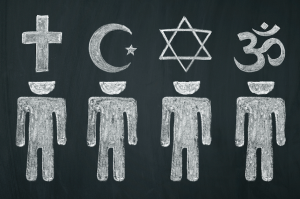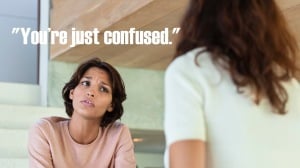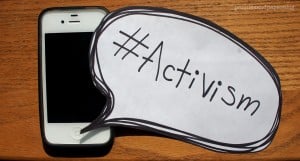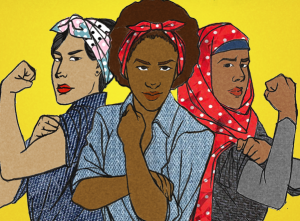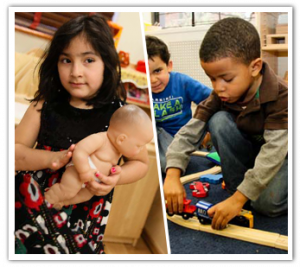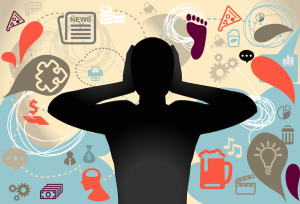
Two people sit on a couch. One extends their arms while explaining something, and the other sits with their arms crossed, looking away.
There are a few defining moments that come to mind when I think about my journey to (and through) atheism. And one of them came when I was seventeen, on the phone with my then-boyfriend, who had said he had some “concerns” about our relationship.
This can’t be good, I thought. He finally came out with it: “Well, it’s just that I don’t think I can be with someone who doesn’t believe in anything.”
I knew exactly what he was talking about. We’d argued about religion plenty of times before, and I knew how important Catholicism was to him.
But “doesn’t believe in anything?” I believed in plenty of things. I believed in science, in altruism, in the goodness of people, in the importance of family, friendship, and culture. That’s “nothing?”
Back then, I didn’t have the language and the confidence to push back against what he was implying. I didn’t even identify as an atheist, because I’d never met an out atheist before and probably didn’t realize that identifying that way was a real option for me.
I knew I didn’t believe in god, but I mumbled something about how I do believe in some sort of vague power that controls the universe (probably thinking to myself that that “power” was the laws of physics), and that seemed to satisfy my boyfriend.
It took me a long time – much longer than that particular relationship ended up lasting – to understand my own reaction and to forgive it.
For a while, I thought that I’d been cowardly, or even that I’d lied. But in the moment, I’d really believed what I was saying. And later on, I understood that high school me lived in a social context where openly professing atheism was absolutely not okay.
It wasn’t until later that I learned about privilege, oppression, and microaggressions. These concepts helped me understand a lot of the dynamics that feminists often discuss, such as sexism, racism, transphobia, and other ways in which our society marginalizes certain people based on their identities.
They also helped me understand my experiences as a Jewish atheist growing up in a society where Christianity is privileged and all other forms of belief and nonbelief are marginalized.
Christian privilege refers to the idea that in our society (and in many others), Christian people receive various social benefits purely because of their religion. Everyone else is denied those benefits and experiences various oppressions instead.
Some of these oppressions occur on a large scale. For instance, many non-Christian children experience bullying and physical violence as a result of their religious identities (or lack thereof). Other oppressions happen on a smaller scale and involve harm that is less obvious or less immediately threatening, but nonetheless painful in a more insidious way.
These are called microaggressions, defined by psychologist Derald Wing Sue as “brief, everyday exchanges that send denigrating messages to certain individuals because of their group membership.”
Initially used with regard to race, this concept has also been extremely useful to me in understanding why some of the comments and questions I get from Christians about atheism sting so much, even when it seems like they’re made with good intentions.
The microaggressions I experience as a white atheist are not the same as the ones that people of minority religions have to deal with, and neither is my oppression itself. In this article, I can only speak to my own experience, and I urge you to listen to the voices of atheists of color as well as religious non-Christians to understand their experiences with Christian privilege.
Here are just a few of the microaggressions that I (and other secular people I know) have heard throughout our lives – and why, despite the good intentions behind some of them, they can be very hurtful.
1. ‘You’ll Change Your Mind When You’re Older’
Young atheists hear this a lot from older Christians.
While it’s true that some people become religious later in life, it’s obviously not true for every secular person. Besides, sometimes even fervent religious believers later become atheists!
Imagine how silly it would sound to say “Oh, you’ll change your mind when you’re older” to a young Christian person.
It sounds just as silly to us, with the added sting of ageism (as if young people never know what they really want, need, or believe!) and the knowledge that our secular identities are considered less legitimate than Christianity.
Young queer and trans people often hear this type of logic from older folks as well. It invalidates our identities and implies that the older person knows what’s good for us better than we do.
But there’s never a good reason to imply that someone’s age makes them incapable of understanding their own identity.
2. ‘Wow, You’re So Nice for an Atheist!’
A friend of mine hears this all the time. While she is truly a nice person, I bet nobody would say, “Wow, you’re so nice for a Christian!” if she were a Christian.
That’s because many Christians stereotype atheists as angry, rude, and confrontational. But rude and confrontational people exist in all religious groups. Just take a look at some of the Christians who have pestered me at length to justify my atheism to them without any provocation on my part.
As for anger, sometimes anger is a valid response to injustice, and secular people have a lot to be angry about.
Anger isn’t an emotion I often feel myself, but I get why others do. I’ve gotten the “so nice for an atheist” comment. But I sympathize deeply with my secular friends who don’t come across as “nice” because they’re more upfront than I am about why Christian privilege is so harmful.
This comment serves as a reminder that, for the Christian person saying it at least, acceptance of me is entirely conditional on how polite I am and how hard I try to avoid ever making them uncomfortable by challenging their privilege.
That’s not okay.
3. ‘I Would Never Date an Atheist (Or Want My Child To)’
Obviously, you have the right to choose your own standards for a partner – just please don’t choose your children’s for them. If someone hates atheists that much, by all means, don’t ask me out.
But when religious people say that they would never date an atheist, what they usually mean is that there’s no way an atheist could be as moral, caring, trustworthy, or likable as a religious person.
Many of the same values that lots of people get from their religions, such as charity, integrity, and respect for others, are values that many atheists emphasize highly as well.
If you’ve thought this through and decided that your partner needs to be a religious believer, that’s fine. But unless someone has specifically asked for your opinion on dating atheists, there’s no reason to say you never would.
All that accomplishes is giving any secular person in your vicinity another reminder that a lot of people really dislike us.
4. ‘Did You Have a Bad Experience in Church?’
Sometimes Christians assume that every atheist was once a Christian who went to a crappy church once.
But some secular people were never interested in religion at all, and some lost their beliefs with time and without any provoking incident. Making unfounded statements like this about someone’s past is presumptuous.
Some people do become atheists as a result of negative experiences with religion. While it’s tempting for well-meaning Christians to remind them that not all churches or types of Christianity are like what they experienced, there’s definitely a #NotAllChristians ring to it.
Sure, not all Christians, but nobody’s obligated to give Christianity a second (or third, or fourth) chance.
These comments remind me of the assumptions some people make about my queerness – that it’s something that happened to me as a result of “bad experiences” with men.
While I don’t think that was the case for me, it can sometimes happen that way. What’s left unspoken with euphemisms like “bad experiences” is that “bad” can mean horrifying, traumatizing, permanently altering.
People who experience spiritual abuse and trauma can’t just brush that off as “a bad experience in church once.” It stays with them forever, and they don’t owe anyone forgiveness.
Identities forged through trauma are as valid as any other.
5. ‘If Not Religion, What Stops You From Doing Immoral Things?’
The assumption that secular people have no moral code is one of the most damaging assumptions about us.
While a Christian asking this question might be doing so out of genuine curiosity – as in, they really want to know how I make ethical decisions – the way the question is framed presumes that only religious belief can be a valid way to make those decisions.
This assumption isn’t just hurtful to individuals who are secular. It also directly influences the many ways in which our society is set up to marginalize secular people.
For instance, some states still prohibit atheists from holding public office. Only 58% of people in the US would vote for a “generally well-qualified” secular presidential candidate, though that’s a substantial increase from past polls. And, as I mentioned earlier, plenty of people like reminding us that they would never date us or “allow” their children to.
The message is clear: Secular people are morally suspect.
Questions like these put the burden on us to prove to the asker’s satisfaction that we’re somehow able to restrain ourselves from lying, cheating, and worse.
Yet plenty of religious people have done terrible things in the name of their religion. While that does not – and should not – implicate all religious believers, or that entire religion, it would be just as fair to ask religious people to justify their own morality as it is to ask atheists.
I try to behave morally because it hurts people when I don’t.
But on a more basic level, most of us feel pretty bad when we do things we know are wrong. Avoiding that awful feeling is a powerful motivator when nothing else works. I bet that most religious people feel a similar way.
They might attribute it to their beliefs, but the point is that most of us are strongly motivated to try to do the right thing, even if we sometimes fail. We’re quite similar that way.
***
Microaggressions hurt. They make us doubt our identities and feel invalidated. They pressure us to give religion another try when we already know it’s not for us. They shame us into keeping our identities hidden, as I did back in high school.
Microaggressions also harm. They reinforce the dominance of Christianity in our society. In small ways, they remind everyone in earshot that Christians are the ones who get to be considered moral, correct, and “normal” by default, whereas secular people (and other non-Christians) always have to defend their claims to morality and acceptability.
They prevent genuine understanding between secular and religious people.
If you’re a Christian who recognizes yourself in some of the examples I’ve listed, you might be wondering how you can better engage with secular people to develop that sort of genuine understanding. You probably didn’t intend to hurt anyone or reinforce Christian privilege through your comments or questions, but intentions aren’t everything.
Instead, try to ask questions that come from a place of curiosity rather than presumption.
For instance, rather than “How can you be moral without god,” you could ask, “How do you make decisions about moral problems?” If you catch yourself coming to your own conclusions about how they became secular, just ask. Many secular people enjoy telling that origin story as much as many religious people like to talk about the moments that brought them to their faith.
And instead of making comments that assume that being secular makes someone’s life more difficult or less meaningful, ask them how their identity enriches them. If they trust you, they might tell you about some of the downsides, too. It could also be that, despite your preconceptions, there aren’t any downsides.
When you commit microaggressions that reveal your assumption that secular people are all rude, immoral, or selfish, you contribute to Christian privilege and to the marginalization of non-Christians, secular and religious.
Dismantling Christian privilege means learning to view non-Christian identities and religions as valid, and just as complex as Christianity. Just as many Christians really dislike being conflated with people like the Westboro Baptist Church or other beliefs they don’t agree with, secular people don’t like being lumped in with that one jerk you met in a freshman philosophy class in college.
Not all secular people are interested in explaining their journeys to you, and that’s fine. But many of us are happy to talk about it. All you have to do is ask us in a genuinely curious way, and be willing to listen.
[do_widget id=’text-101′]
Miri Mogilevsky is a Contributing Writer for Everyday Feminism and a recently graduated with a Masters in Social Work and is starting a career as a counselor in Columbus, Ohio. She loves reading, writing, and learning about psychology, social justice, and sexuality, and is working on her cat photography skills. Miri writes a blog called Brute Reason, rants on Tumblr, and occasionally even tweets @sondosia.
Search our 3000+ articles!
Read our articles about:
Our online racial justice training
Used by hundreds of universities, non-profits, and businesses.
Click to learn more





